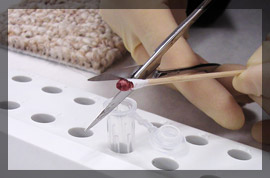Archival Notice
This is an archive page that is no longer being updated. It may contain outdated information and links may no longer function as originally intended.
Home | Glossary | Resources | Help | Contact Us | Course Map
One problematic area for the prosecutor is the area of retesting of DNA samples. Retesting is recognized as the best manner of exposing a potentially fallacious test result. Issues of retesting are best addressed through pretrial motions after the bench has been apprised on this.
Although the defense may attack the state's typing, the defense has no burden to perform a retest of the questioned sample. The prosecutor should take care not to improperly shift the burden of proof by suggesting the defense should have conducted additional typing on the sample. The prosecutor should, however, during the direct examination of its own DNA analyst, establish whether a portion of the DNA evidence was preserved. If so, it should be permissible to ask the defense expert whether he or she ever examined the state's evidence. Similarly, the prosecutor may then inquire whether the defense expert ever requested that the sample be provided for additional typing.
For purposes of impeachment, where the defense expert challenges the typing results, not the statistics, the prosecutor may inquire into whether the expert agrees that re-testing is a proper scientific procedure when reliability is questioned. If the defense expert challenging the typing says "no", the prosecutor may attempt to impeach his/her testimony with a learned treatise (NRC II) and show the failure of the expert to use a definitive and readily available method to ascertain reliability. This line of questioning would be a fair response to the challenge without stating that the defendant had any obligation to test (no burden shifting) nor that the failure to test by the defendant constituted an implication of guilt.
|
Fallacious Test Result |
|
"A wrongfully accused person’s best insurance against the possibility of being falsely incriminated is the opportunity to have the testing repeated [NRC II at pg 87]." |
Additional Online Courses
- What Every First Responding Officer Should Know About DNA Evidence
- Collecting DNA Evidence at Property Crime Scenes
- DNA – A Prosecutor’s Practice Notebook
- Crime Scene and DNA Basics
- Laboratory Safety Programs
- DNA Amplification
- Population Genetics and Statistics
- Non-STR DNA Markers: SNPs, Y-STRs, LCN and mtDNA
- Firearms Examiner Training
- Forensic DNA Education for Law Enforcement Decisionmakers
- What Every Investigator and Evidence Technician Should Know About DNA Evidence
- Principles of Forensic DNA for Officers of the Court
- Law 101: Legal Guide for the Forensic Expert
- Laboratory Orientation and Testing of Body Fluids and Tissues
- DNA Extraction and Quantitation
- STR Data Analysis and Interpretation
- Communication Skills, Report Writing, and Courtroom Testimony
- Español for Law Enforcement
- Amplified DNA Product Separation for Forensic Analysts


